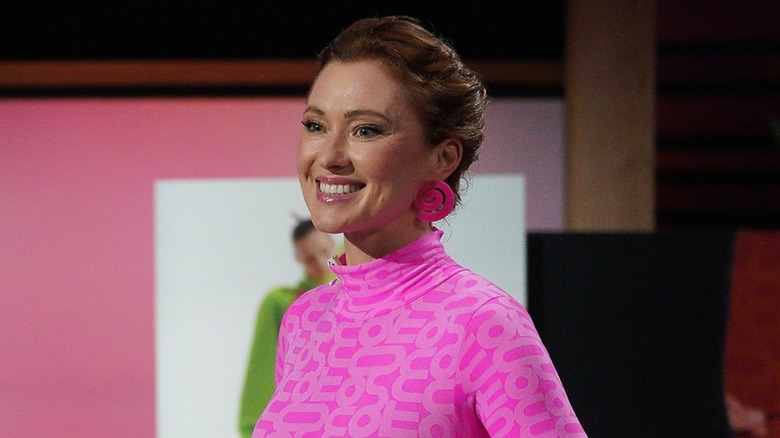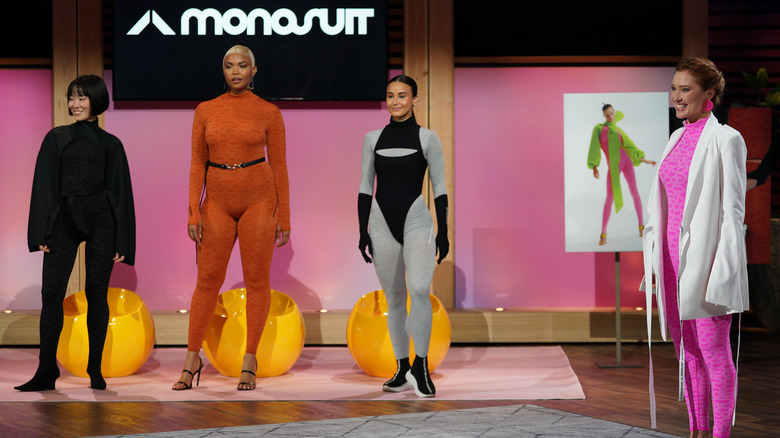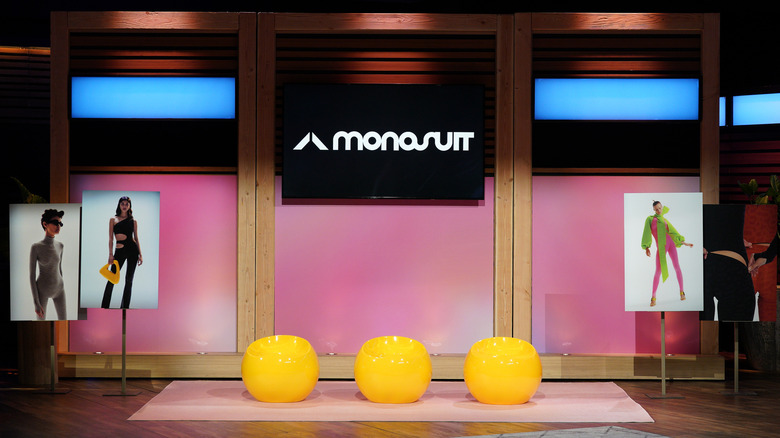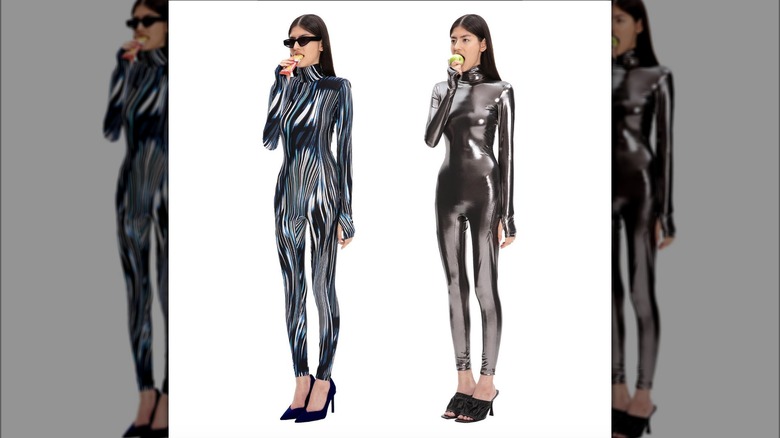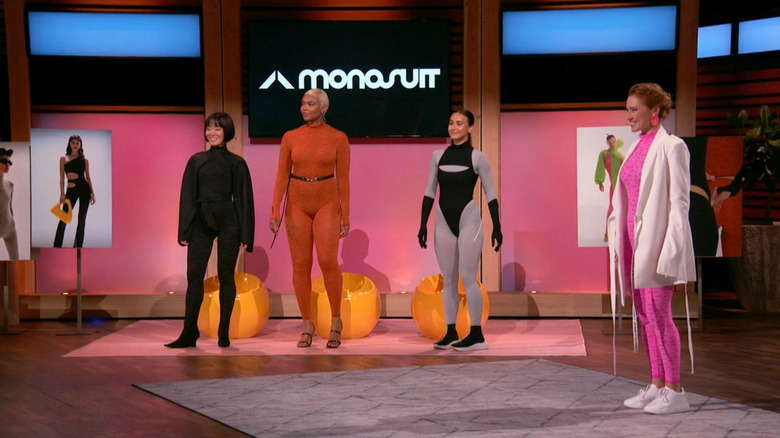What You Need To Know About Monosuit From Shark Tank
The ongoing 15th season of "Shark Tank" has already seen a bounty of entrepreneurial offerings ranging from faux chocolate to human remains disposal to baseball equipment. In Episode 2, Valentine Aseyo pitched his male leggings company Matador Meggings, made of sleek, form-fitting spandex. Monosuit, which is set to be featured in Episode 4, dares to ask, Why stop at the legs?
Founded in 2013 in Moscow by Mia Murr, Monosuit crafts innovative, unisex jumpsuits. For Murr, the idea was born out of a desire to streamline fashion. "At Monosuit we open people's minds to the idea of an easy-to-wear one clever piece of garment, which can be worn with the zipper upfront, backwards and even upside down," the company's website reads. "You don't have to have overstuffed bags and overload your wardrobe anymore."
Indeed, the versatile monosuits can be styled and layered for any activity, whether it's a jog, travel, or outfitted with a blazer for a business meeting. In coming up with the design, practicality was key; the monosuits feature patented secret zippers in the lower back, solving the awkward problem of wearing the suit in a public restroom without needing to strip down.
Here's everything you need to know about Monosuit.
Monosuit is an environmentally conscious brand
For most fashion brands, environmental considerations are usually taken into account well into the company's existence. That wasn't the case for Monosuit, whose environmental impact was baked into its conception. Mia Murr noticed that most clothing had a "linear lifestyle," she explained to Office Magazine, meaning that clothes are typically purchased, worn, and then discarded into a landfill.
"My dream from the beginning was for someone to buy my clothes, wear them, and then after the person doesn't need the clothes anymore, we need to recycle it back," Murr continued. Turning the spent product into reusable fibers or thread could create new clothes, she posited, resulting in a concept that involves zero waste.
After years of research and prototypes, Monosuit launched its first Eco Monoskin in 2019, 40% of which is made of materials produced from garbage in the ocean. The waste is made into capsules, which are ground down into a powder, which is turned into threads. The process, Murr explained, uses less water than produced organic cotton.
Monosuit's focus on sustainability extends beyond the jumpsuits' material. "We also use digital patterns instead of real paper and 3D modelling instead of sewing a bunch of samples," Murr told Not Just a Label. "We never overstock to avoid waste and use a special software for high-precision layouts to minimize the fallout in the cut. We do not have products of animal origin in our collections. We strive to create seasonless, trendless, and long-term wear!"
Monosuit is a New York Fashion Week staple
Monosuit's clothing may be practical and sustainable, but that doesn't mean it sacrificed its fashion sensibility. Mia Murr made a point of including her brand in one of the fashion industry's biggest events. "Our strategy was to participate in New York Fashion Week every season," she said in the same Office Magazine interview. "We started in 2018, twice a year in New York, just to get visibility."
Murr's efforts paid off — in part, she says, thanks to an American fashion sensibility that is more open and experimental than her native Moscow. A number of celebrities have modeled or purchased Monosuit goods, including Kim Kardashian, Paris Hilton, Alicia Keys, and Madonna. Additionally, Monosuit has been featured in Vogue, The Cut, Vanity Fair, and Elle, to name just a few outlets.
Monosuit's increasing visibility also led to a seed round of investment. "That's when we realized that the world is interested in us," Murr told Not Just a Label. "It helped other wonderful things to happen: new collections, lookbooks, web site development, etc." That investment, however, begs the question of how much additional funding Murr will seek on "Shark Tank."
Monosuit is inspired by sci-fi
With Monosuit's slick design and shimmering patterns, it's unsurprising that the brand was influenced by sci-fi and futurism. "I'm ... a big fan of space and space travel and it feels very futuristic," Mia Murr said in her conversation with Office Magazine. She also pointed to specific films and directors, including the works of Stanley Kubrick, the 1972 Soviet sci-fi film "Solaris," and Ishiro Honda's 1968 movie "Destroy All Monsters."
Murr's interest in science fiction and outer space began growing up in Moscow. "My childhood was full of dreams that maybe just in a year or two, we would be traveling between the planets easily," she continued. "I'm still waiting for that moment — hopefully it will be soon. And that's why I need to be prepared in terms of what I can wear!"
The company didn't just look to cosmonauts for inspiration, though. When it was first developing its flagship jumpsuits, Monosuit targeted communities that were used to form-fitting, streamlined apparel. "We approached certain communities that often choose jumpsuits for their for work or hobby — cyclists, yoga guys, surfers, car racers, etc.," Elena Skazhenyuk, Monosuit's head of sales and marketing, told Not Just a Label. "These people were more likely to consider wearing a monosuit for their daily activities than those who had never worn a jumpsuit before."
What happened to Monosuit on Shark Tank?
As Mia Murr walks — or, rather, dances and sings — into "Shark Tank," it's hard to tell what's more scattered: her or her business. Through a half-rapped, half-sung musical number, the entrepreneur bounces around with little distinction between explaining how her product will help save the oceans to explicitly demonstrating the strategically placed zipper at its rear.
Having somehow raised $2 million in angel investments at a staggering valuation of $12 million, Murr is now offering somewhat of a shark discount at $150,000 for 5% (imputing only a $3 million valuation). Though her design skills and $245,000 in sales over the past 12 months seem to impress the investors, none of them can figure out what exactly Murr envisions Monosuit becoming. The consensus among the sharks seems to be that the strongest angle for the business is fashion, with Robert Herjavec and Barbara Corcoran going as far as to imply it could compete with Lululemon. But, as Mark Cuban points out, that's really only a third of her business.
Murr spent the initial $2 million she raised on developing the technology to infinitely recycle her garments — technology that still seems to need significant development. Unable to reconcile the trident aims of developing cutting-edge tech, competing as a fashion brand, and being a viable ecological alternative to traditional jumpsuits, Cuban, Corcoran, Herjavec, and Kevin O'Leary all go out. Lori Greiner is the last to withdraw, stating that $150,000 is "nothing" compared to what Murr needs.
Sadly, Murr exits the tank empty-handed, and during her post-show interview, she expresses disappointment that the sharks' intense focus on making money prevented them from seeing the ecological benefits of her product.
